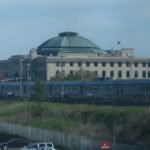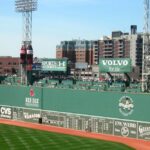Photo Recap – Perth and Fremantle
Most people think that three nights on a train is an eternity. Me? I’m always sorry when I near the end of a train ride, no matter how long I’ve been on board. It’s true again as I sit having breakfast on the last morning of the last day of this ride on the Indian Pacific.
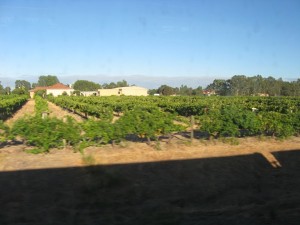 Today, after almost two days of arid, sun-baked desert, everything is different. An hour before our arrival in Perth, the train is rolling through fertile valleys. This is one of Australia’s wine-producing regions and there are many vineyards passing by as we enjoy breakfast in the dining car.
Today, after almost two days of arid, sun-baked desert, everything is different. An hour before our arrival in Perth, the train is rolling through fertile valleys. This is one of Australia’s wine-producing regions and there are many vineyards passing by as we enjoy breakfast in the dining car.
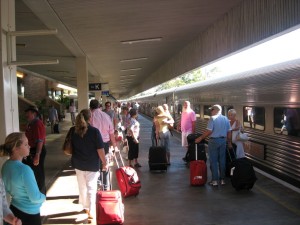 Most of the Indian Pacific’s passengers linger on the platform at the East Perth Railroad Terminal, saying good-by and exchanging phone numbers and email adresses with new friends.
Most of the Indian Pacific’s passengers linger on the platform at the East Perth Railroad Terminal, saying good-by and exchanging phone numbers and email adresses with new friends.
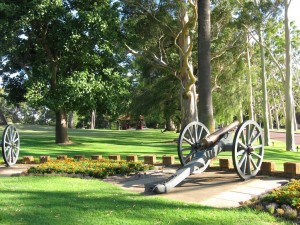 Kings Park is a highlight of any visit to Perth. Originally King’s Park, being named for Edward VII, the Aussies eventually dropped the apostrophe and the park now honors any British king who might come to mind. Whatever … it’s beautiful and serene and a wonderful, mellow way to spend two or three hours.
Kings Park is a highlight of any visit to Perth. Originally King’s Park, being named for Edward VII, the Aussies eventually dropped the apostrophe and the park now honors any British king who might come to mind. Whatever … it’s beautiful and serene and a wonderful, mellow way to spend two or three hours.
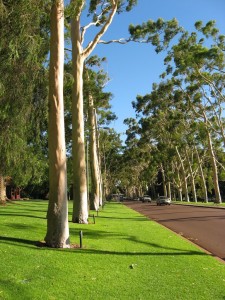 Many of the trees in Kings Park, including these that line one of the roadways through the area, were planted to honor one of the young men of Perth who fell in battle thousands of miles away. (Note the plaques at the base of each tree.) Nearby there is a simple but elegant memorial built around an eternal flame, inscribed with some all-too-familiar names: Gallipoli, El Alamain, Tobruk and others.
Many of the trees in Kings Park, including these that line one of the roadways through the area, were planted to honor one of the young men of Perth who fell in battle thousands of miles away. (Note the plaques at the base of each tree.) Nearby there is a simple but elegant memorial built around an eternal flame, inscribed with some all-too-familiar names: Gallipoli, El Alamain, Tobruk and others.
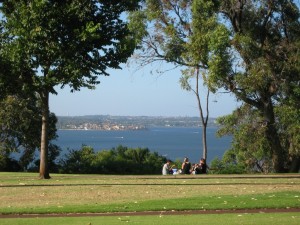 The park overlooks the Swan River which passes through the adjacent port city of Fremantle where it empties into the Indian Ocean.
The park overlooks the Swan River which passes through the adjacent port city of Fremantle where it empties into the Indian Ocean. Perth, by the way, lays claim to being “the most isolated capital city in the world.” Well, maybe. What about Honolulu, the capital of the State of Hawaii? The West Coast of the U.S. is the closest land mass, and it’s 2400 miles away.
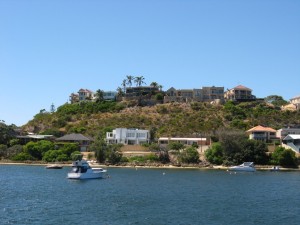 My second day in Perth, I took a cruise up the Swan River from Fremantle, passing a number of very posh homes built on bluffs with commanding views of all the traffic on the river.
My second day in Perth, I took a cruise up the Swan River from Fremantle, passing a number of very posh homes built on bluffs with commanding views of all the traffic on the river.
 My second day in Perth, I took a cruise up the Swan River from Fremantle, passing a number of very posh homes built on bluffs with commanding views of all the traffic on the river.
My second day in Perth, I took a cruise up the Swan River from Fremantle, passing a number of very posh homes built on bluffs with commanding views of all the traffic on the river.Tomorrow: Heading way up north to tropical Darwin

